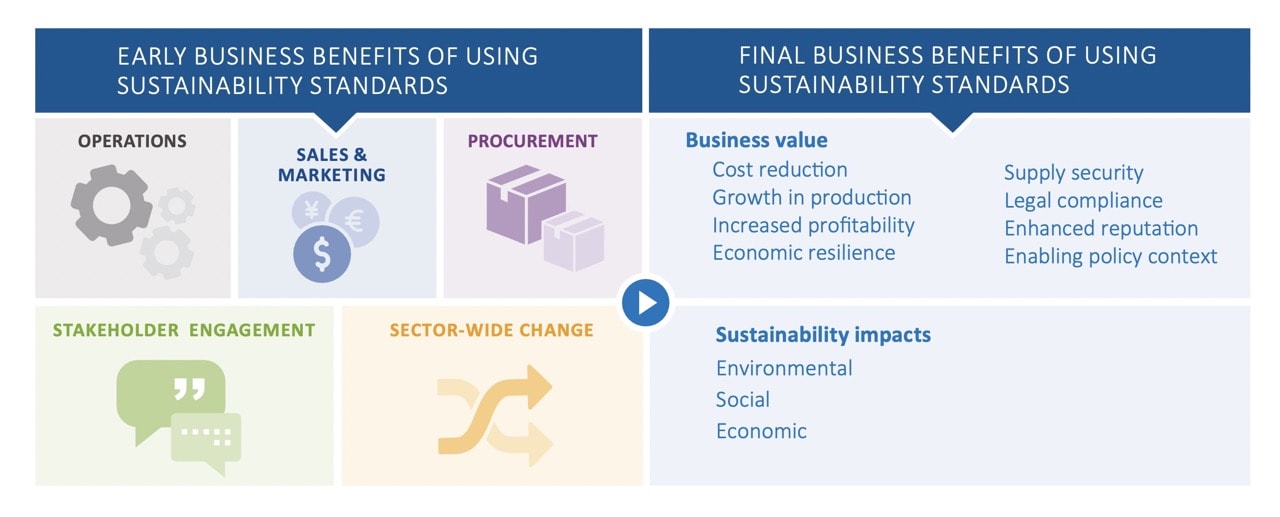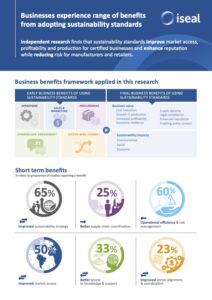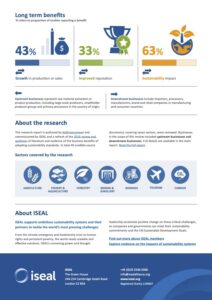How do businesses benefit from adopting sustainability standards?

Voluntary standards and other sustainability systems are good for people and planet. An ever-growing library of studies provides evidence of standards driving positive impacts – from improving labour practices and boosting smallholder incomes to increasing biodiversity and tree cover.
But are they good for business? Ultimately, most companies will only invest in using sustainability systems if there’s a compelling business case. The latest review of the evidence suggests there is.
Sustainability standards benefit every stage of the value chain
ISEAL commissioned AidEnvironment to carry out a comprehensive review of recent literature and evidence on the business benefits of using sustainability standards, following up a similar study from 2016. Focusing only on the most credible source documents from the last six years, they reviewed 40 studies covering seven sectors – agriculture, fisheries, forestry, mining, biomass, tourism and carbon.
The review found clear evidence that using sustainability standards brings benefits for businesses beyond the social and environmental outcomes that sustainability systems are designed to address. These benefits reached businesses large and small, at every stage of the value chain, and include both immediate and long-term benefits.
Early benefits
While sustainability impacts require long-term commitment, businesses can quickly realise benefits from adopting sustainability standards.
Operational benefits were the most widely cited, mentioned in 83 percent of studies. In two-thirds of cases (65 percent), these were linked to how standards help businesses to develop, operationalise and monitor their sustainability strategies. Almost as many studies (60 percent) found evidence that standards improve operational efficiency and risk management, particularly for producers, leading to tangible benefits ranging from cost savings to reduced workplace accidents.
Almost three-quarters of sources (73 percent) cited benefits related to sales and marketing. These included improved market access, price premiums and supporting the company’s marketing strategy. Downstream companies also spoke of the benefits of using sustainability systems in procurement: standards helped to reduce risks and strengthen transparency and traceability in supply chains, and to improve relationships with reliable suppliers.
Half the studies also found that using standards improves engagement with other stakeholders, including communities, NGOs, governments and the finance sector. Beyond the individual business, the use of standards can also lead to sector-wide improvements by promoting coordination and alignment and influencing public policy.
Long-term benefits
The early benefits of using sustainability standards strengthen business value and sustainability impacts over time. Adopting standards can be seen as a long-term asset, and it may take time for the return on investment to become clear. Compared to early benefits, these long-term or ‘final’ benefits are also more likely to be influenced by external factors.
Nevertheless, the study found evidence of standards contributing to long-term business value. These included growth in production, sales and/or revenue (43 percent of sources), improved reputation (33 percent), cost reduction (25 percent), improved profitability (23 percent) and, a big difference to the previous study, the explicit reference to resilience (20 percent).
It’s important to remember, too, that positive environmental and social impacts themselves can be good for business. Avoiding conflicts with local communities, for example, can result in reduced costs and reputational risks. Better working conditions can improve productivity and staff retention. Sustainable management of forests or fisheries helps guarantee long-term supply security.
Sustainability standards continue to be one of the most important tools to support businesses across the value chain to deliver on core sustainability issues. Nearly two-thirds of sources (63 percent) identified sustainability impacts as important final business benefits.
Areas for improvement
Despite the clear evidence of business benefits, there are a few caveats. The AidEnvironment review didn’t attempt a comprehensive cost-benefit analysis of using standards – this is an area that needs further research. In certain cases, the evidence is mixed: some studies find that adopting standards lead to better prices for producers and increased profitably for brands, others do not.
Business benefits are not realised uniformly and can vary according to a business’s position in the value chain. A lot depends on the length of engagement with the standard, the nature of the sector and the broader context. The structure of the sustainability system and the services that it offers make a difference too.
ISEAL members are committed to creating value for businesses that use their systems – it’s one of the ISEAL Credibility Principles. ISEAL is working to strengthen the efforts of schemes to deliver more business value.
Original article by Rita Mendez, Senior Coordinator, Impacts, ISEAL
DOWNLOAD THE REPORT HERE

DOWNLOAD THE INFOGRAPHIC HERE




